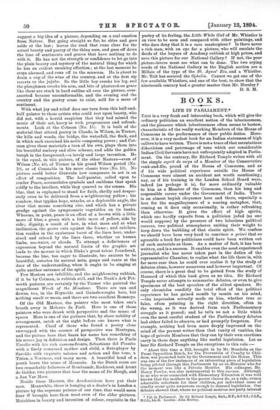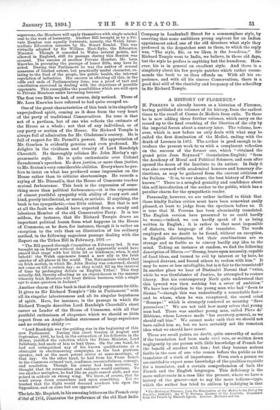BOOKS.
LIFE IN PARLIAMENT.*
This is a very fresh and interesting book, which will give the- ordinary politician an excellent notion of the laboriousness, and the pleasure which laboriousness often seems to bestow, characteristic of the really working Members of the House of Commons in the performance of their public duties. More- over, it is a very modest book for an Indian statesman of high calibre to have written. There is not a trace of that ostentatious-
didacticism and patronage of tone which our considerable Indian Civil Servants have not nnfrequently adopted in Parlia-
ment. On the contrary, Sir Richard Temple writes with all the simple esprit de corps of a Member of the Conservative rank-and-file, proud of the House of Commons, and as
if his wide political experience outside the House of Commons were almost an accident not worth mentioning ; nay, as if his training in the London School Board were, indeed (as perhaps it is), far more ordinarily valuable to him as a Member of the Commons, than his long and responsible career under the Government of India. There is an almost boyish eloquence here and there, especially a love for the magniloquence of a soaring metaphor, that, coining as it does only occasionally, is rather refreshing than otherwise. It gives the effect of high spirits, which one hardly expects from a politician jaded (as one
would suppose) by the pressure of two laborious politica/ careers, two political atmospheres uniting their weight to keep down the bubbling of that elastic spirit. We confess we should have been very hard to convince a priori that so agreeable a book for politicians could have been written out of such materials as these. As a matter of fact, it has been written, and is a success. It enables even the most experienced journalist who has never taken part in the duties of the representative Chamber, to realise what the life there is, with far more ease than he could ever realise it by the study of debates alone, however numerous and however important. Of course, there is a great deal to be gained from the study of
Hansard of which this book gives us no idea. Sir Richard Temple never attempts to summarise debates, or even to give specimens of the best speeches of the ablest speakers. He only chronicles candidly the total effect of the political experience he has gained month by month on his mind, —the impression actually made on him, whether true or- false, often pointing in the right direction, often in the wrong, as it was derived from each Parliamentary struggle as it passed; and he tells us not a little which even the most careful student of the Parliamentary debates had either failed to observe, or had promptly forgotten. For example, nothing had been more deeply impressed on the mind of the present writer than that vanity of vanities, the hope of private Members that they can by their own exertions. carry in these days anything like useful legislation. Let us hear Sir Richard Temple on the exceptions to this rule
About this time a Bill, brought in by Mr. Mundella on the Front Opposition Bench, for the Prevention of Cruelty to Chil- dren, was promoted both by the Government and the House. This. was one of the few instances of an interesting piece of legislation being piloted through this Parliament by an ex-Minister who for- the moment was like a Private Member. His colleague, Mr. Henry Fowler, was also instrumental to this success. Although to us who were connected with Elementary Education it was well known that the mothers in the poorer classes do, as a rule, evince admirable solicitude for their children, yet individual cases of cruelty occur quite numerous enough to demand legislation. Our debates showed that, where no political motives nor party interest • lgs in Parliament, By Sir Richard Temple, Bart, MP, ct,CI S.I,, D.O.L., LL.D. London: John Murray. supervene, the Members will apply themselves with single-minded zeal to the work of humanity. Another Bill brought in by a Pri- vate Member was equally fortunate, namely, the Welsh Inter- mediate Education measure by Mr. Stuart RendeL This was virtually adopted by Sir William Hart-Dyke, the Education Minister. Though it conceded to Wales several points, not allowed in England, still its passage during this Session was secured. The success of another Private Member, Mr. Lees Knowles, in procuring the passage of lesser Bills, may here be noted. During this Parliament he was the author of several measures of limited extent, but practically useful character, re- lating to the food of the people, the public health, the internal regulation of industries. His success in effecting all this, in the odds and ends of Parliamentary time, was a proof of tact and conciliation exercised in dealing with the objections of possible opponents. This exemplifies the possibilities which are still open to Private Members under favouring breezes."
The first two Bills we had, of course, duly noticed. Those of Mr. Lees Knowles here referred to had quite escaped us.
One of the great characteristics of this book is its singularly unprejudiced spirit, coming as it does from the very heart of the party of traditional Conservatives. Its tone is that not of a partisan, but of one who reflects the estimate of the House as a whole ; not that of any individual, or of any party or section of the House. Sir Richard Temple is always full of admiration for Mr. Gladstone's oratory. He is full of respect for Mr. Parnell's powers. His appreciation of Mr. Goschen is evidently genuine and even profound. He delights in the vividness and vivacity of Lord Randolph Churchill. He thoroughly relishes Mr. John Morley's epi- grammatic style. He is quite enthusiastic over Colonel Saunderson's speeches. He does justice, or more than justice, to Mr. Sexton's very considerable abilities. Everywhere he pre- fers to insist on what has produced some impression on the House rather than to criticise shortcomings. He records a saying of Mr. Disraeli's, that the House of Commons teaches mutual forbearance. This book is the expression of some- thing more than political forbearance,—it is the expression of almost youthful sympathy with ability of every sort and kind, purely intellectual, or moral, or artistic. If anything, the book is too sympathetic,—too little critical. But that is not at all the fault we should have expected from a steady and laborious Member of the old Conservative Party. It is too seldom, for instance, that Sir Richard Temple draws an important political lesson from what happens in the House of Commons, as he does, for instance, though it is rather an exception to the rule than an illustration of his ordinary method, in the following sagacious passage dealing with the Report on the Tithes Bill in February, 1891 :—
"The Bill passed through Committee on February 3rd. It was brought up on Report without delay, and apparently would have passed that stage with but little let or hindrance, when, lo and behold ! the Welsh opponents found a new ally in the Irish quarter of all places in the world. The Nationalists wished that an Irish motion, in which Mr. John Morley was concerned, should not come on till a, certain day ; so they would fill up the interval of time by prolonging debate on English Tithes ! This they actually did, thereby affording us an object-lesson in the manner whereby Irish Members will treat British business, with a single eye to some question in Ireland."
Another charm of this book is that it really represents its title. It gives us Sir Richard Temple's "life in Parliament" with all its singular laboriousness and all its singular boyishness of spirit. Here, for instance, is the passage in which Sir Richard Temple describes Lord Randolph Churchill's short career as Leader of the House of Commons, with all that youthful enthusiasm of eloquence which we should so little expect from an Anglo-Indian statesman of large experience and no ordinary ability :—
"Lord Randolph was the guiding star in the beginning of this new Parliament. During this short Session of August and September, 1886, he had, in the estimation of his followers in the House, justified the selection which the Prime Minister, Lord Salisbury, had made of him to lead them. On the one hand, he had not relinquished any of his known qualifications as a strategist in electioneering campaigns, as the best platform speaker, and as the most potent orator at mass-meetings, of that day. On the other hand, he had from his Front Bench in the Commons evinced tact, readiness, resourcefulness, courage, and resolution. Though his course had been meteoric, we thought that its coruscation and radiance would continue. To use another metaphor, he had like an eagle soared aloft, and was poised in mid-air on strong wing. We knew, of course, that he must swoop down somewhere and upon something. Yet we trusted that the flight would descend nowhere but upon the Opposition, and on none but our opponents."
The late Mr. BagehotN in his amusing letters on the French coup d'itat of 1851, illustrates the preference of the old East India Company in Leadenhall Street for a commonplace style, by asserting that some ambitious young aspirant for an Indian appointment asked one of the old directors what style they preferred in the despatches sent to them, to which the reply was, "The style, Sir, as we likes, is the humdrum." Sir Richard Temple went to India, we believe, in those old days, but the style he prefers is anything but the humdrum. How- ever, his is in general an excellent style. And there is a, simplicity about his few purple patches which rather recom- mends the book to us than offends us. With all his ex- perience, and with all his sincere Conservatism, there is a good deal still of the elasticity and buoyancy of the schoolboy in Sir Richard Temple.







































 Previous page
Previous page